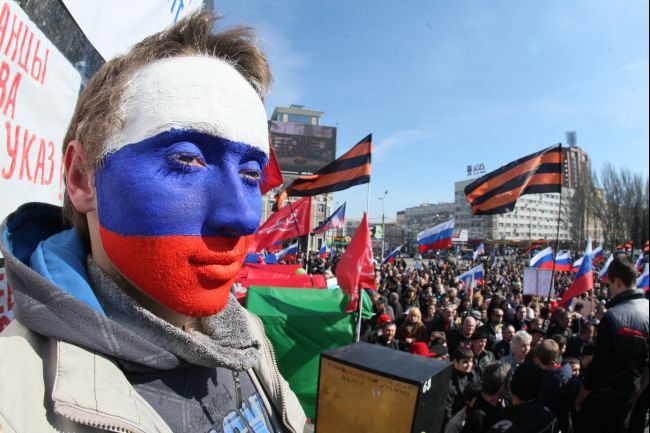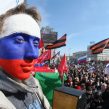
The Question of Political Power in Ukraine’s East (Part Two)
Publication: Eurasia Daily Monitor Volume: 11 Issue: 92
By:

Political forces supportive of Ukraine’s unity hold the upper hand in six provinces (oblasts) that Moscow seeks to carve out as “South-Eastern Ukraine” or split off as “Novorossiya.” Following the chaotic regime change in Kyiv, pro-Ukraine forces coalesced locally to maintain or restore stability in the Kharkiv, Dnipropetrovsk, Zaporizhia, Kherson, Mykolayiv and Odessa provinces. Inroads made by pro-Russia groups in two major cities, Kharkiv and Odessa, have been halted and reversed in April and early May, respectively. Conversely, Russia has turned the Donetsk and Luhansk provinces (Donbas) into a theater of political-military conflict against Ukraine’s statehood (see EDM, May 14).
Although the Maidan protest movement removed the Party of Regions forcibly from the government in Kyiv, the new government of Maidan politicians moved quickly to work with substantial elements of the former ruling party for stabilizing Ukraine’s eastern and southern provinces. Local “oligarchs” and parts of the administrative-economic nomenklatura, long associated with the Party of Regions, buttressed stability and loyalty to the state in these Ukrainian provinces (see EDM, March 6). The government in Kyiv relies on those entrenched power brokers to serve as heads of provincial administrations (“governors”) or to support Kyiv’s own political appointees as governors in these provinces.
The Party of Regions, long dominant in these parts of Ukraine (and still the single largest party in Ukraine’s post-Maidan parliament), is compellingly interested in the preservation of Ukraine’s territorial integrity. This it does not regard as a national-Ukrainian project (the party remains largely a-national) but rather as a means to protect the vested business and political interests associated with the Party of Regions.
With its electorate and economic base heavily concentrated in Ukraine’s south and east, the Party of Regions and associated interest groups have no future under Russia’s influence in a “federalized” Ukraine. Larger Russian oligarchs would, in that case, displace those of Ukraine’s east. The Kremlin is already campaigning for a new brand of Greater Russia–minded activists to displace the Party of Regions. The “Novorossiya” project threatens Ukrainian national interests and the Donbas captains of industry equally. Russia’s proxy warfare in Ukraine’s east seeks to destroy the authority of the central government and that of the local nomenklatura at the same time.
Opposed on the whole to “federalization,” the Party of Regions and affiliated business interests are calling instead for administrative and financial de-centralization in Ukraine’s east and south. The Ukrainian government is drafting similar proposals (not only for the east and south, but on a country-wide basis). Under both sets of proposals, Ukraine’s provinces would elect their governors and district-level executives, and would retain the tax proceeds for the local budgets.
While consensus seems fully attainable on that basis (see EDM, February 19), contention looms over the status of the Russian language. In parliament and in the eastern provinces, the Party of Regions calls for upgrading the constitutional status of the Russian language to that of a state language, alongside Ukrainian. The present government in Kyiv might split and fall over this issue; but the Party of Regions regards this issue as vital to its electoral fortunes in Ukraine’s east.
During the month of April, the Party of Regions’ organizations in the Donetsk and Luhansk provinces adopted resolutions supporting Ukraine’s unity (as against federalization), calling for de-centralization and state-language status for the Russian language as conditions for unity (see above). The party promotes this agenda in the parliament in Kyiv. It contradicts Russia’s project to “federalize” Ukraine (indeed it should blunt that project) and it conflicts head-on with the secessionist program of Russia’s proxies in Donbas. The Party of Regions’ organizations in that part of Ukraine opposed the holding of the May 11 secession “referendums” under the pro-Russia forces’ guns (see EDM, May 8, 12, 14). Some of the party’s own voters turned out in numbers higher than expected for those “referendums” (Interfax-Ukraine, UNIAN, May 11–15).
In the short term at least, those “referendums” and inconclusive “anti-terror operations” have unnerved the Party of Regions’ parliamentary caucus in Kyiv and several of its political leaders in Donbas.
On May 15, Mykola Levchenko (a young and rising leader, who was backing Ukraine’s unity in April in Donetsk—see above) led a walkout of Party of Regions and Communist deputies from the parliament in Kyiv. On behalf of his party (and joined by Communist leader Petro Symonenko on that party’s behalf), Levchenko demanded an immediate end to the government’s “anti-terror” operations against pro-Russia armed groups, and “peace negotiations” with (presumably) their leaders. On May 14, at the inaugural session of round table talks moderated by the Organization for Security and Cooperation in Europe (OSCE), the billionaire businessman Vadym Novinsky spoke out in that same vein, apparently intimidated by the ongoing events in Donbas. Novinsky is an influential figure in Mykolayiv province, but was elected to Ukraine’s parliament from the single-mandate constituency of Sevastopol (Ukrinform, Ukraiynska Pravda, May 14–16).
Moscow lacks any credible or reliable political allies in Ukraine’s east and south. It relies, instead, on coercion and armed violence to disrupt Ukraine’s presidential election, and then to contest the election’s legitimacy (see accompanying article).




